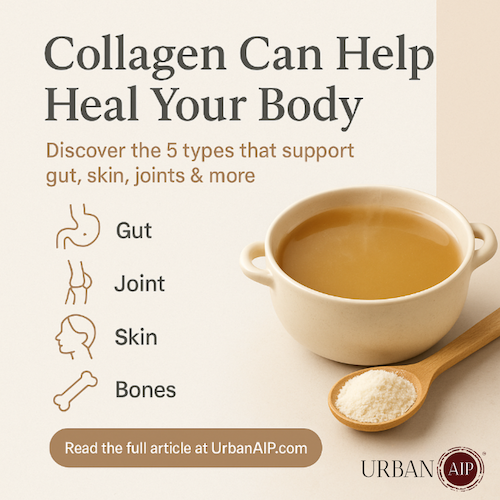
As a Nutritional Therapy Practitioner, an AIP Certified Coach — and someone who’s been on my own autoimmune journey — I’ve seen firsthand how powerful food can be when it comes to healing.
When we follow the dietary portion of the Autoimmune Protocol (AIP), our goal isn’t just to “avoid bad foods.” It’s about giving our bodies the right tools to calm inflammation, repair the gut, and rebuild tissue from the inside out. And that’s precisely where collagen comes in.
Collagen is like the scaffolding that holds your body together — your skin, joints, bones, gut lining, and even your blood vessels rely on it. While your body naturally produces collagen, chronic inflammation, autoimmune disease, and aging can significantly slow down production. That’s why I’m such a believer in intentionally adding collagen-rich foods to your AIP lifestyle.
But here’s the kicker… not all collagen is created equal. Different types of collagen play different roles in the body, and knowing which ones do what can make a real difference in your healing journey.
Collagen Types and Benefits
There are 16 types of collagen, but we’ll focus on the big five, which are the most abundant in the body and cover key areas of focus when it comes to tissue repair and healing.
Let’s break it down:
|
Type |
Where It’s Found |
Key Benefits |
Best Sources |
|
Type I — The Strength Builder |
Skin, bones, tendons, connective tissue |
Glowing skin, strong joints, resilient bones |
Marine collagen, bovine collagen, grass-fed beef bone broth |
|
Type II — The Joint Protector |
Cartilage |
Eases joint pain and stiffness; supports joint health |
Chicken collagen, cartilage-rich broths |
|
Type III — The Gut Guardian |
Skin, blood vessels, organs |
Gut lining repair, cardiovascular support, improved elasticity |
Bovine collagen (often paired with Type I) |
|
Type V — The Tissue Organizer |
Cornea, placenta, tissue surfaces |
Supports cell structure, hair health, tissue integrity |
Multi-collagen blends, organ meats |
|
Type X — The Bone Healer |
Cartilage and bones during growth and repair |
Supports bone healing and recovery from injury or chronic inflammation |
Chicken collagen, bone marrow |
What about “Plant Collagen”?
I get asked about this a lot, and I’m sure you’ve seen it on the shelves of your favorite grocery store as well. So, what type of collagen comes from plants? Unfortunately, there’s no such thing as plant-based collagen. Yep, it’s all about marketing, sadly. Collagen is a structural protein only found in animals.
What you’ll find in so-called “plant collagen” products are nutrients that can support your body’s natural collagen production, like vitamin C, silica, and specific amino acids.
But here’s the key:
🌱 The vitamin C and silica come from plants.
🧬 The amino acids (like glycine, proline, and hydroxyproline) used in supplements are typically derived from fermentation using yeast or bacteria, not from plants themselves.
These nutrients may help your body make collagen, but they don’t actually contain collagen.
So if you’re looking for real collagen benefits — like gut lining repair, joint support, or skin health, you’ll want collagen from animal-based sources.
Why Collagen Diversity Matters
It’s easy to think, “I’m covered — I add chicken collagen to my broth!” But just like with vegetables, muscle meats, or healthy fats, diversity is key when it comes to collagen.
As we’ve established, each type of collagen plays a different role in your body — from joint health to gut lining repair, skin elasticity to bone strength. If you only focus on one source (like chicken or marine collagen), you’re only giving your body part of the picture.
When we eat a variety of collagen-rich foods — chicken, beef, wild-caught fish, bone marrow, organ meats — we’re providing a full spectrum of collagen types, along with other nutrients that support collagen production and tissue repair.
🦴 Think of it like cross-training for your healing journey — the more variety you give your body, the better equipped it is to restore, rebuild, and thrive.
So whether you’re sipping bone broth, adding collagen peptides to your morning routine, or enjoying a nourishing Urban AIP meal, remember: more diversity means more healing power.
Why Collagen Matters on the AIP Diet
If you’re dealing with joint pain, gut issues, skin flare-ups, or poor nutrient absorption — collagen isn’t just helpful, it’s essential. By adding high-quality, clean collagen (no junky additives or sweeteners), you can:
- Fortify your gut lining (can help with asthma)
- Support joint flexibility and mobility
- Improve skin, hair, and nail health
- Help your body recover from inflammation, workouts, or injury
- Nourish tissues impacted by autoimmune conditions
AIP-Approved Collagen Sources
🦴 Homemade bone broth from pasture-raised chicken or grass-fed beef
🍮 Gelatin from grass-fed sources (think gummies or gut-healing broths)
🫀 Organ meats
🐟 Wild-caught fish for marine collagen
💪 Clean collagen peptides from trusted AIP-friendly brands
Using the power of nutrient-dense prepared meals to maximize your healing
Urban AIP’s meals are crafted to optimize nutrient density and diversity while adhering to the core elimination phase of AIP. It’s no surprise that you will find a wide variety of collagen-rich meal options, without the stress of meal prep. Here’s a simple guide to help you optimize collagen diversity in your next meal box:
Type I — The Strength Builder


Type III — The Gut Guardian



To Sum it up
Collagen isn’t just a beauty buzzword — it’s a vital part of your healing toolkit. Whether you’re at the start of your journey or deep in the work of healing, intentionally adding different types of collagen can give your body the building blocks it needs to repair, restore, and thrive.
Happy healing!
Marie-Noelle


